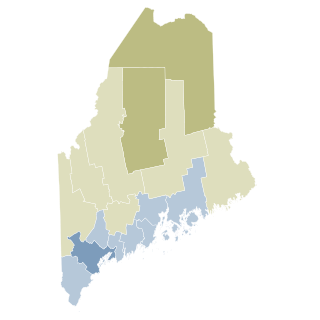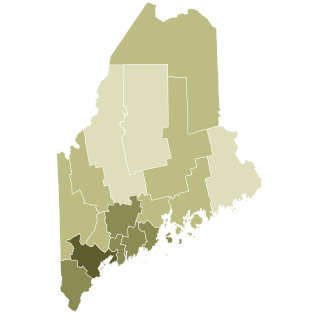
Ranked-choice voting (RCV) can refer to one of several ranked voting methods used in some cities and states in the United States. The term is not strictly defined, but most often refers to instant-runoff voting (IRV) or single transferable vote (STV).

Matthew Dunlap is an American politician from Maine who has served as the Maine State Auditor since November, 2022, and previously from January to October, 2021. A Democrat, Dunlap served as Secretary of State of Maine from January 7, 2013, to January 4, 2021, and previously served in that same post from 2005 to 2011. In 2012, he sought to become his party's nominee to replace retiring Olympia Snowe, but lost in the primary to State Senator Cynthia Dill. Prior to his first election as secretary of state in 2005, he represented Old Town in the Maine House of Representatives for four terms beginning in 1996. On December 2, 2020, Dunlap was elected Maine State Auditor by the Maine Legislature and took office on January 4, 2021. Dunlap had to vacate the position after failing the exams needed to meet the requirements of the position the following October, and was replaced by Jacob Norton. He did later meet the requirements and was selected for the position again on November 14, 2022.
Same-sex marriage has been legally recognized in Maine since December 29, 2012. A bill for the legalization of same-sex marriages was approved by voters, 53–47 percent, on November 6, 2012, as Maine, Maryland and Washington became the first U.S. states to legalize same-sex marriage by popular vote. Election results were certified by the Maine Secretary of State's office and the Governor of Maine, Paul LePage, on November 29.

Maine Question 1 was a voter referendum conducted in Maine in the United States in 2009 that rejected a law legalizing same-sex marriage in the state. The measure passed 53–47% on November 3, 2009.

Maine Question 1 was a voter referendum on an initiated state statute that occurred on November 6, 2012. The referendum was held to determine whether or not to legalize same-sex marriage. The referendum passed with a 53-47% vote legalizing same-sex marriage in Maine.

Maine Question 1 (MQ1), "An Act To Prohibit the Use of Dogs, Bait or Traps When Hunting Bears Except under Certain Circumstances", was a citizen-initiated referendum measure in Maine, which was voted on in the general election of November 4, 2014. As the Maine Legislature declined to act on the proposed statute, it was automatically placed on the ballot. The proposal was defeated by 320,873 "No" votes to 279,617 "Yes".

The 2018 Maine gubernatorial election took place on November 6, 2018 to elect the governor of Maine. It occurred along with elections for the U.S. Senate, U.S. House, and other state and local elections. Incumbent Republican governor Paul LePage was term-limited and could not seek re-election to a third consecutive term; he later unsuccessfully sought a third term in 2022. This was one of eight Republican-held governorships up for election in a state carried by Hillary Clinton in the 2016 presidential election.

Maine Question 1, "An Act To Strengthen the Maine Clean Election Act, Improve Disclosure and Make Other Changes to the Campaign Finance Laws", was a citizen-initiated referendum measure in Maine, which appeared on the November 3, 2015 statewide ballot. As the Maine Legislature did not exercise its ability to pass the bill on its own, it was placed on the ballot and approved by Maine voters.

Maine Question 5, formally An Act to Establish Ranked-Choice Voting, is a citizen-initiated referendum question that qualified for the Maine November 8, 2016 statewide ballot. It was approved by a vote of 52% in favor, 48% opposed. It sought to change how most Maine elections will be conducted from a plurality voting system to a ranked-choice voting system. It appeared on the ballot along with elections for President of the United States, Maine's two U.S. House seats, the legislature, five other ballot questions, and various local elections. The referendum was successful, making Maine the first state to use ranked choice voting for its federal elections.

Maine Question 1, "Do you want to reject the section of Chapter 399 of the Public Laws of 2011 that requires new voters to register to vote at least two business days prior to an election?", was a 2011 people's veto referendum that rejected a bill repealing Election Day voter registration in Maine. The vote was held on November 8, 2011 after being placed on the ballot due to supporters collecting the necessary number of signatures. The veto effort was successful, with 237,024 votes in favor of repeal to 155,156 against repeal.

Maine Question 4, formally An Act to Raise the Minimum Wage, is a citizen-initiated referendum question that appeared on the Maine November 8, 2016 statewide ballot. It sought to increase Maine's minimum wage from $7.50 per hour to $12 an hour by 2020, as well as increasing the minimum wage for tipped employees gradually to the same level by 2024. It would also index increases after 2024 to inflation. As the Maine Legislature and Governor Paul LePage declined to enact the proposal as written, it appeared on the ballot along with elections for President of the United States, Maine's two U.S. House seats, the Legislature, other statewide ballot questions, and various local elections. Efforts to place a competing, more moderate proposal alongside the citizen-initiated bill were unsuccessful.

Maine Question 3, formally An Act to Require Background Checks for Gun Sales, was a citizen-initiated referendum question that appeared on the Maine November 8, 2016 statewide ballot. It sought to require a background check for virtually all gun transfers in Maine, with some exceptions. As the Maine Legislature and Governor Paul LePage declined to enact the proposal as written, it appeared on the ballot along with elections for President of the United States, Maine's two United States House seats, the Maine Legislature, other statewide ballot questions, and various local elections.

Maine Question 2, formally An Act to Establish The Fund to Advance Public Kindergarten to Grade 12 Education, was a citizen-initiated referendum question that appeared on the Maine November 8, 2016 statewide ballot. It sought to increase state aid to public schools by instituting a surcharge of 3% on Maine income taxes for those with income above $200,000 a year. As the Maine Legislature declined to enact the proposal as written, it appeared on the ballot along with elections for President of the United States, Maine's two U.S. House seats, the Legislature, and various local elections.

Maine Question 1, formally An Act to Legalize Marijuana, is a citizen-initiated referendum question that qualified for the Maine November 8, 2016 statewide ballot. It was qualified for the ballot after a Maine Superior Court judge ordered that petitions rejected by the Maine Secretary of State be reconsidered. The proposal sought to legalize the recreational use of marijuana in Maine for those over the age of 21, and institute a 10 percent tax on its sale. As the Maine Legislature and Governor Paul LePage declined to enact the proposal as written, it appeared on the ballot along with elections for President of the United States, Maine's two U.S. House seats, the Legislature, other statewide ballot questions, and various local elections.

Election results in Maine comprise voting for local, gubernatorial and federal public offices, members of the state legislature, as well as ballot measures. Congressional elections are held every even year, and gubernatorial ones every off-presidential even year.

Maine Question 2, formally entitled "An Act To Enhance Access to Affordable Health Care", was a citizen-initiated ballot measure that appeared on the November 7, 2017 statewide ballot in the State of Maine. Maine Question 2 sought to expand Medicaid eligibility under the terms of the Affordable Care Act. The measure passed.

Maine Question 1, formally An Act To Allow Slot Machines or a Casino in York County, was a citizen-initiated referendum question that appeared on the November 7, 2017, statewide ballot in Maine. It sought to award a license for the construction and operation of a casino in York County, Maine by a qualified entity as spelled out in the proposed law, with tax revenue generated by the casino to go to specific programs. The wording of the proposed law effectively permitted only one company, Capital 7, to be awarded the license. The ballot measure was defeated, with 83% of voters opposing it.
Two referendums were placed on the statewide ballot in Maine in 2018. Both were citizen initiated proposals.

2020 Maine Question 1 was a people's veto referendum that sought to reject a new law which eliminated religious and philosophical exemptions from school vaccination requirements and for employees of nursery schools and health care facilities. The question appeared on the statewide ballot on March 3, 2020, coinciding with the Democratic and Republican presidential primaries for the 2020 U.S. presidential election.

Massachusetts Ranked-Choice Voting Initiative, also known as Question 2, was an initiative at the 2020 Massachusetts general election that would have changed primaries and elections in Massachusetts from plurality voting to ranked-choice voting (RCV) for all Massachusetts statewide offices, state legislative offices, federal congressional offices, and certain other offices beginning in 2022. RCV would not be extended to elections for president, county commissioner, or regional district school committee member. The initiative failed, with 54.8% of voters voting 'No' and 45.2% 'Yes'.











